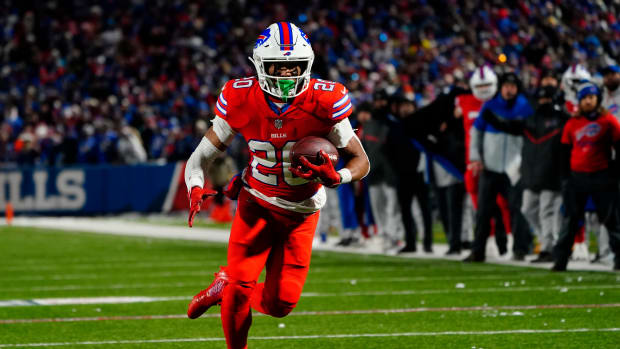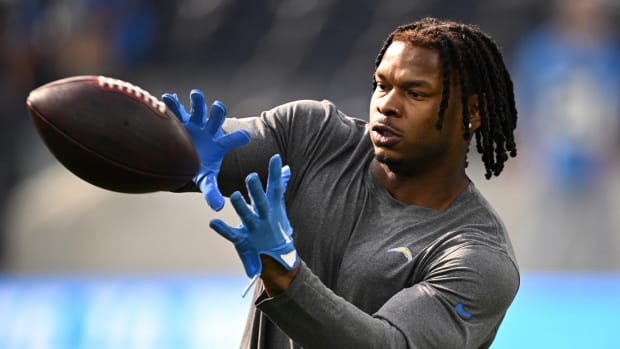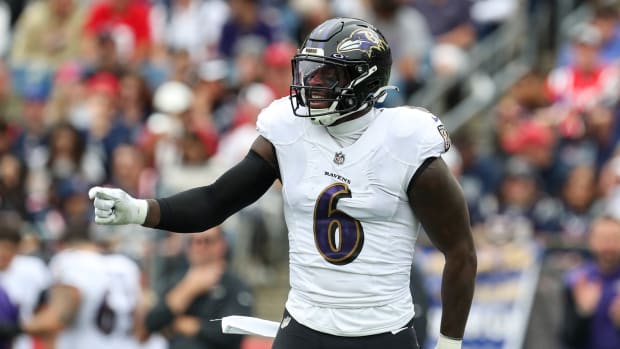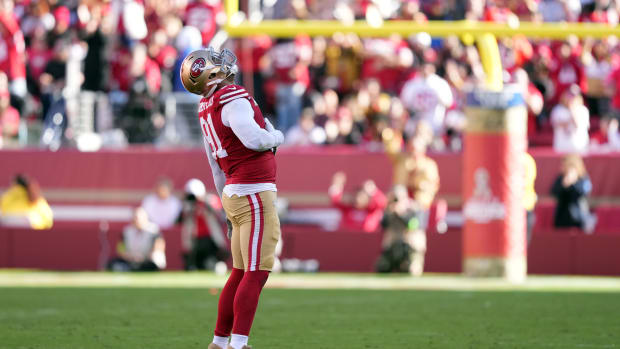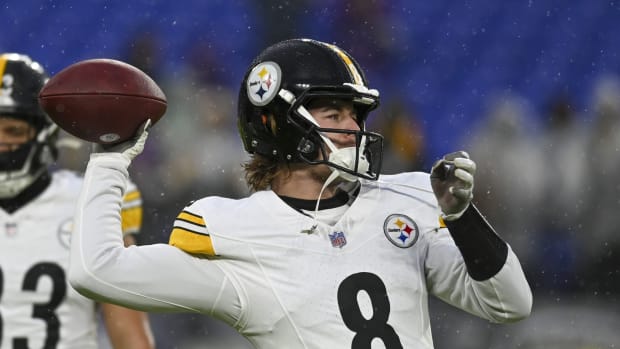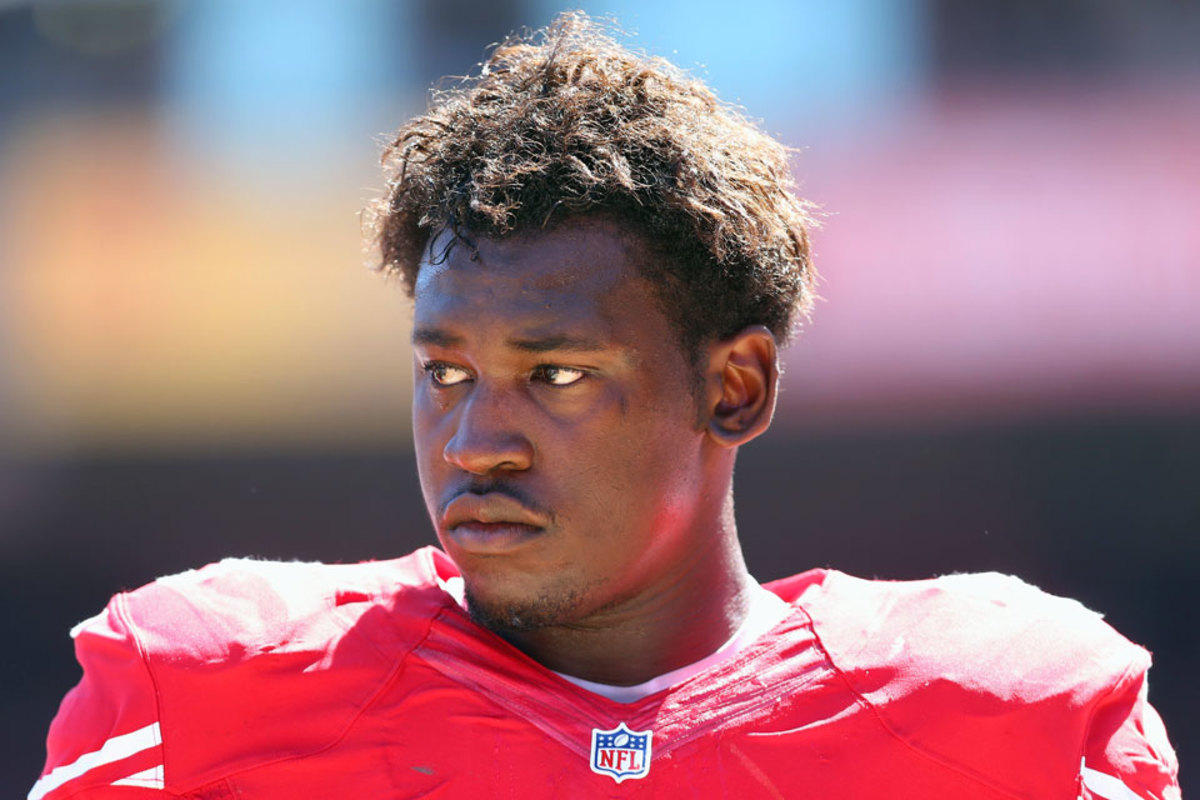
No Win-Win Situation
The 49ers finally won another football game on Thursday night for the first time since the season opener, which happened 19 days ago but seems like 38.
They did so without All-Pro outside linebacker Aldon Smith, who is in a treatment center, reportedly for a substance abuse problem, and has taken an indefinite leave of absence from the team. So, coach Jim Harbaugh and general manager Trent Baalke have weathered their first “crisis”—this is football, after all, not the real word—since coming into power in 2011. And the 49ers would be very happy if you just forgot about what happened last weekend.
Sorry, but I can’t do that. Just because the 49ers played another game, and just because Smith is finally getting help, doesn’t excuse the team for allowing Smith to play every snap against the Colts on Sept. 22. The decision was deplorable; it showed that San Francisco doesn’t stand for anything but winning games—or at least trying to, as they suffered the double-embarrassment of losing by 20. Harbaugh proved that he is every bit the football-focused zealot he purports himself to be, and not in a good way.
Jim Harbaugh allowed Aldon Smith (pictured atop page) to practice just hours after being arrested on Sept. 20, then play two days later.
To quickly recap: Smith was arrested at 7:02 a.m. on Sept. 20 morning for suspicion of drunken driving and marijuana possession after running his truck into a tree. His blood alcohol level was .15, nearly twice the legal limit, according to the San Jose Mercury News. A witness told the newspaper that the wheels were still spinning after the accident. This comes after Smith was arrested for suspicion of DUI in Miami Beach in January 2012, charges that were later reduced to reckless driving after he agreed to attend DUI school and perform community service. In June 2012, Smith hosted a house party at which two people were shot and he was stabbed. Smith still faces possible charges for possessing illegal assault rifles on the premises.
Despite this backdrop, despite Smith being arrested again, the 49ers let him practice just four hours after running his truck into a tree. “I encouraged it,” Harbaugh said after that day’s practice. “I felt like he needs to go to work, face his teammates and soldier through it.”
Gee-whiz, Jim, did you make him run extra wind sprints as extra punishment, too?
If Smith had gone into work and pointed a gun at people, would the 49ers have acted differently? Of course. See, to me—and I know I’m not alone—I don’t see any difference between the two. Smith made the decision to put himself behind the wheel while allegedly impaired. And, yes, I understand people make mistakes and I do believe in second chances. But how many chances are the 49ers going to give Smith?
The 49ers allowed Smith to play for a few reasons. They liked that he wanted to show accountability to his teammates and to the media after the game. And the 49ers didn’t want to do anything to disrupt what is really important here, that Smith admitted he has a problem and wanted to seek treatment during an NFL season. It’s really an unprecedented step, and Smith should be commended for that part. It’s just that everything else is wrong.
San Francisco won again, Smith is finally getting help, but don’t think for a second that everything about this situation is right.
This is what the team should have done: After his arrest, Smith never should have been allowed to practice. He should have been ordered to watch practice from the sidelines, then address his teammates afterward. Accountability. On game day against the Colts, deactivate Smith. But make him stand on the sideline in full view of the crowd and television cameras. Force him to watch his teammates play without him, then make him address the media. More accountability. Smith would still get his full salary, so no issue could be raised by the players’ union. Instead, the 49ers chose the most expedient option for the game against the Colts. The game plan was finished, Smith was in it, so accountability could wait.
It was the wrong decision then—and even now as Smith is getting help—it remains wrong, a calculated choice the 49ers hope you’ll forget about. Funny how things worked out on the field though. The Niners used Smith against the Colts and got humiliated at home—with Smith blowing his assignment on Andrew Luck’s game-sealing touchdown on a bootleg. Without Smith on Thursday, San Francisco cruised to a 35-11 win over the Rams, allowing just 188 yards. San Francisco won again, Smith is finally getting help, but don’t think for a second that everything about this situation is right.
First ...
Brady has completed just 57.5% of his throws, the worst rate of his career.
Despite beating the Buccaneers, 23-3, the Patriots’ offense is still out of whack. Quarterback Tom Brady has not played well to this point, partly because he’s faced three defenses (Bills, Jets and Bucs) that specialize in changing their pre- and post-snap looks. Those kinds of schemes always put doubt in Brady’s mind, where there normally is none. He’ll face another this week from Falcons defensive coordinator Mike Nolan. In games against these varied schemes, Brady has to trust (more than usual) that his receivers will be in the right places. But the Pats’ young receivers are still repeating many of the same mistakes: making cautious, rounded-off cuts at the top of routes (Kenbrell Thompkins); not adjusting routes quickly enough based on coverage (Aaron Dobson); unable to beat coverage (Michael Hoomanawanui and Zach Sudfeld); and showing an overall lack of polish in the system (Josh Boyce). With Julian Edelman commanding more double teams, Brady is running out of options. It would really help if the Patriots doubled down more on the running game. It has been impressive most of the time, and their best plays have come off hard run action. This offense must start showing gradual improvement if it hopes to be executing at a high level later in the season.
... and 10
1. I tried looking for clues as to how the Colts bottled up the 49ers’ running game so well after the Niners rushed for 67 yards on their only scoring drive in the first quarter—they would get just 24 more on the ground. Couldn’t really find any, though. The Colts basically played the same techniques up front. They might have had their inside linebackers play a shade deeper to give them a better shot at fitting the run. But that’s it. The Colts simply out-executed the 49ers up front.
2. One thing that is more certain when it comes to defending 49ers: teams have no trouble slamming one safety into the box on early downs. It’s tough to run against that. This won’t change until Colin Kaepernick starts hitting on deep passes more consistently. Including Thursday night’s Rams game, he’s 4 of 16 for 119 yards with one touchdown and one interception (52.9 rating) on deep passes, according to the anlaytics website ProFootballFocus.com. Last season, with Michael Crabtree, Randy Moss and Mario Manningham, he was 25 of 49 for 779 yards, five touchdowns and one interception (122.2). Kaepernick’s deep accuracy is what made the 49ers (and the read-option) so dangerous. Anyone can defend any running scheme when you have little concern about getting beat deep. But when you have to defend that deep part of the field and be aggressive near the line of scrimmage, that spells trouble. Kaepernick and his lack of viable deep targets isn’t posing a deep threat, and I don’t see how the Niners rectify that.
Rookie QB Mike Glennon will make his NFL debut in place of Josh Freeman on Sunday.
3. The Buccaneers (0-3) benched quarterback Josh Freeman this week. The problems so far have been partly his fault. For whatever reasons, he doesn’t look well-prepared. Whether that’s entirely his fault for not putting in the work, or if offensive coordinator Mike Sullivan should share some of the blame, I’m not sure. There have been times when Freeman’s teammates are running one play, and he’s running another. Of course, it doesn’t help when receiver Mike Williams is running the wrong route, which he appeared to do twice last weekend against the Patriots. And, in what has been a Greg Schiano staple since his Rutgers days, the Buccaneers’ scheme is outdated, unimaginative and too reliant on short plays. The short and intermediate passing game that is so crucial in today’s NFL is essentially nonexistent in Tampa’s system. It’s difficult to win without it. The thing is, the Buccaneers have solid pass protection—the line ranks No. 8 in our pressure points/per snap rankings—and running back Doug Martin is second in the league, averaging 99 yards a game. Those are two essential components of playing Schiano’s preferred style of offense. It means something is amiss with the quarterback and receivers. From my vantage point, both positions share the blame here. It’s just easier to replace one quarterback than get several receivers to play better.
4. I thought the Titans’ game-winning drive against the Chargers last Sunday said more about San Diego’s defense than it did Jake Locker and Tennessee’s offense. The Chargers’ secondary played very passively; the front line brought pressure just twice, making things easy for Locker. He did make two very nice throws: a sideline pass to Damian Williams when cornerback Derek Cox had his back turned, and the pass dropped by Delanie Walker. The touchdown was a tremendous individual effort by rookie Justin Hunter against a cornerback in Crezdon Butler, who had recently joined the team. That said, the game appears to be slowing down a little for Locker. But we’ll see if he’s really improving when he faces the Jets on Sunday.
5.The Dolphins’ 3-0 start has belied some of the concerns that could trip them up. There’s no question that Miami’s defense is terrific. Cornerback Brent Grimes, whom nobody wanted coming off ACL surgery, has fortified the secondary. The defensive line, anchored by Paul Soliai and Randy Starks, has been tough against the run. First-round pick Dion Jordan looks like he is going to be an impact player later this season. But the offensive line continues to be an issue, and there aren’t many chain-movers among the tight ends and receivers. The receivers are very good on the outside; the offense just lacks inside threats for easy throws. The Dolphins will get a very good test on Monday night. New Orleans is a brutal place to play, and Rob Ryan’s defense will test the offensive line and outside weapons. And Drew Brees & Co. will show us just how good the Dolphins’ defense really is.
6. Another top-notch physical opponent, another poor performance by quarterback Matt Schaub and the Texans’ offense. And another loss for Houston, this time to the Ravens. It’s the same blueprint that we’ve seen from the Texans in recent losses to the Patriots (twice last season) and Ravens (2011 playoffs). No one is going to take Schaub, who shrinks in the biggest games, and the Texans seriously until they knock off one of the league’s top teams. Houston has a prime opportunity to show how tough it is when the Seahawks visit on Sunday. There isn’t a more physical team on either side of the ball.
Texans QB Matt Schaub isn't thriving against the league's best teams.
7. The Giants and the Steelers are mirror images of each other up front. Both offensive lines have been terrible in pass protection and run blocking. When those offenses can’t establish the run, the quarterbacks try to compensate and do too much. It’s not a recipe for success. Ask Drew Brees about last season.
8. Speaking of the Giants, their struggling line now gets to face the league’s leading sack team on Sunday. The Chiefs have 15 so far, and outside linebacker Justin Houston leads all players with 7.5. Somebody in the NFL’s scheduling department must really like Houston. This will mark the third time in four starts he’s gone against a rookie right tackle: Luke Joeckel (Jaguars), Lane Johnson (Eagles) and now Justin Pugh (Giants). “It’s not a bad way to start off the season,” Houston told me this week.”
9. It’s becoming more and more noticeable: pass protection from running backs is on the decline, perhaps due to the league’s recent practice restrictions. Some of the guys who have been brutal, according to the Pro Football Focus ratings: Alfred Morris (Redskins), Chris Ogbonnaya (Browns), Jordan Todman (Jaguars), Ray Rice (Ravens), Lamar Miller and Daniel Thomas (Dolphins), Darren McFadden (Raiders) and Jason Snelling (Falcons). Not surprisingly, all of those teams have overall pass protection problems—reinforcing the idea that it’s a protection unit (line, back, tight ends, quarterback) and not just the linemen. Should be interesting to see if the Patriots attack Snelling on Sunday night with blitz-crazy Brandon Spikes. I would bet on it.
10.
The five fastest teams: Bills (21.22 seconds), Eagles (22.12), Browns (24.33), Packers (25.06), Broncos (25.15). Slowest five: Cowboys (31.40), Raiders (30.35), Chargers (30.13), Seahawks (30.10), Falcons (30.5).




































